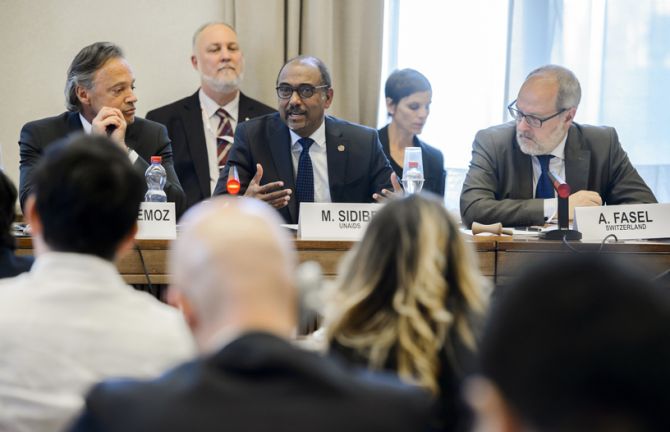

Feature Story
Towards a people-centered approach to the world drug problem
22 October 2015
22 October 2015 22 October 2015Ahead of the United Nations General Assembly Special Session (UNGASS) on the World Drug Problem that will take place in New York in April 2016, senior representatives of several United Nations agencies have taken part in a high-level multi-stakeholder perspective in Geneva, Switzerland. The aim of the event was to explore ways to transform the current drug control system into a measurable response that is people-centered and grounded in respect for public health concerns and human rights.
The meeting, co-hosted and co-chaired by Switzerland and Colombia, covered several key themes that will be further debated during preparatory consultations by the Commission on Narcotic Drugs in Vienna in the run-up to the UNGASS.
Introducing the panel, Switzerland’s Ambassador to the United Nations in Geneva said that stakeholders had already demonstrated their engagement to explore the global drugs issue through the lens of human rights and public health.
“We want to continue to build on this momentum by reiterating our commitment for drugs policies that are people centered and by underscoring the powerful nexus between human rights and public health,” said Ambassador Alexandre Fasel.
In his contribution to the debate, the Executive Director of UNAIDS, Michel Sidibé, said it was crucial for public health to be at the heart of future drug and criminal justice policies.
“The criminalization of people who use drugs is fueling the HIV epidemic,” said Mr Sidibé, “It is an injustice that people who use drugs are being left behind in the AIDS response when we know what works. Investment in harm reduction is a crucial foundation of an efficient drugs policy that not only saves lives but is also cost-effective. Everyone has the right to health.”
Harm reduction strategies such as opioid substitution therapy (OST) and needle-syringe programmes have proved successful in several countries, including Australia, the Netherlands, Portugal and Switzerland. However, less than one third of countries provide needle and syringe programmes for people who inject drugs. People who inject drugs are 28 times more likely to become infected with HIV than the general population. Only 14% of people who inject drugs living with HIV have access to antiretroviral medicines.
Also present on the panel was the Deputy Executive Director of the UNODC, Aldo Lalé-Demoz, who underlined that public health considerations have not been prominent enough in international drug policy and the criminal justice system.
“Public health needs have not been sufficient in international drug policy and the criminal justice system,” he said. “Access to HIV prevention, treatment, and care for people who use drugs is far below what is needed.”
Many panelists stressed that the UNGASS presented an historic opportunity to recast the international response to the world drug problem.
“As we approach next year’s UNGASS, we have a once-in-a-generation opportunity to rebalance international policies on drugs and to increase the focus on public health, on prevention, on ensuring treatment, on care and on harm reduction.” said Marie-Paule Kieny, Assistant Director-General of the World Health Organization.
In a special video message, the United Nations High Commissioner for Human Rights, Zeid Ra’ad Al-Hussein, called on States to consider the decriminalization of the possession and use of drugs and establish stronger public health responses, as recommended by the UN’s Special Rapporteur on the right to health.
“Criminalization of possession and use of drugs causes significant obstacles to the right to health,” said Mr Ra’ad Al-Hussein. “Drug users may justifiably fear that they would be arrested or imprisoned if they seek health care. They may even be discouraged about seeking information about safe practices for drug use.”
Panelists also agreed on the need for alternative development strategies that enabled sustainable livelihoods to reduce dependence on organized crime, drug trafficking and drug production.
Also on the panel were Colombia’s Ambassador to the United Nations in Geneva, Beatriz Londoño Soto, the Chair of the International Drug Policy Consortium, Mike Trace and, appearing via video link from New York, the UN Assistant Secretary-General for Policy Coordination and Inter-Agency Affairs, Thomas Gass.
The high-level panel discussion took place as a group of more than 120 law enforcement officials in the United States called for fewer people to be imprisoned for minor offences including the possession and use of small quantities of drugs.
The Law Enforcement Leaders to Reduce Crime and Incarceration said many inmates jailed for minor offences such as shoplifting and possession of small quantities of drugs were in need of care and treatment unavailable in prisons.



